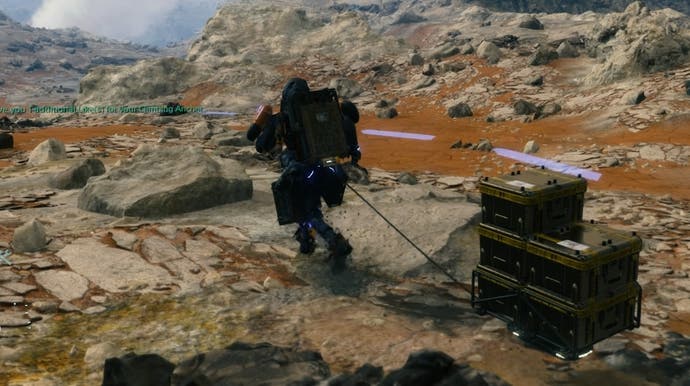Together, alone: the radical promise of pathfinding in Death Stranding
Deliverance.
Hauling DNA samples and pizza through the desolate America of Death Stranding, I found myself thinking of the paths that wander in amongst the hills of my birthplace in Yorkshire. The best-known of these is the Dales Way, an 80-mile stretch of moor and meadow that follows the River Wharfe up past its headspring to the shores of Lake Windermere. The Way was officially added to British maps in 1969, following the establishing of our National Parks, but the path's origins go back a lot further. It is formed from a multitude of much older paths, trodden into the resonant, well-rooted soils and glaciated rock of the Yorkshire Dales by generations of travellers. Walking down the valley between Dent and Ribblehead, you can feel all those aggregated footfalls echoing in your very bones. Ancient artisans bearing flaked greenstone from the Neolithic axe factories in Langdale. Monks journeying to and from Bolton Abbey, and mourners from outlying villages carrying loved ones to the cemetery. Wanderers and the lost. Deliverers of one kind or another.
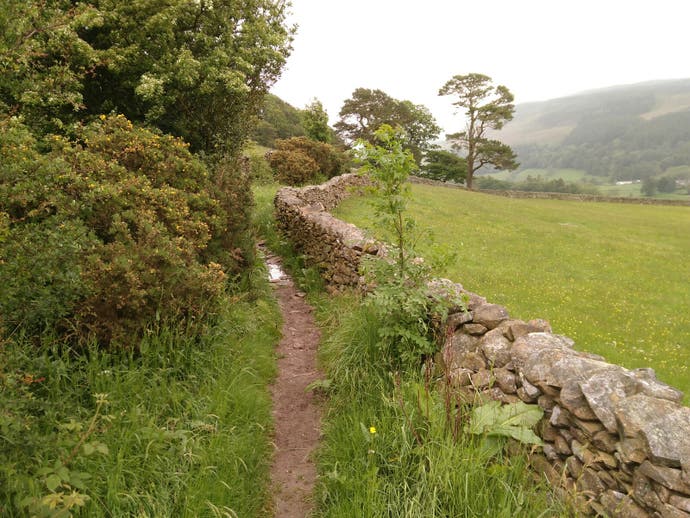
Paths like these at once unify and divide. They represent the fossilised labour of thousands, all engaged in the same act of thinking and feeling their way through geography, aiding (and, at times, misdirecting) each other with every fresh trail pushed through stacks of goldenrod and cow parsley. They are a kind of on-going conversation, a long, straggling sentence written and rewritten by different hands. They are also an argument of sorts with the landowners and lawmakers who would design and divide the world from on high - an argument perceptible in every sharp turn to evade some thrusting expanse of private land. You are always talking to somebody as you follow a path. But for the most part, of course, these are people you encounter only through their remnants. You experience a sense of kinship with them, of shared effort and purpose, by virtue of the fact that they are no longer here.
Death Stranding captures this strangely mingled sense of isolation and camaraderie like few games before, though we shouldn't ignore the precedents set by other virtual odysseys, such as Where the Water Tastes Like Wine. Set on a continent ravaged by time distortions and the malingering dead, it is a game about beating paths through the end of history, plotting routes and erecting structures which are then discreetly shared with other players online. It is about passive, automatic but not unthinking solidarity with people embroiled in the same, arduous trek from coast to coast. These players are everywhere around you as you play - you can call to them if they're in the same location - but, as with the asymmetrical multiplayer elements of Dark Souls, they are seldom visible presences you can interact with directly. For much of the game, you'll notice them because they have already moved on, leaving hillsides decked with climbing rope and forked zipline posts glowing like church spires on mountain summits.
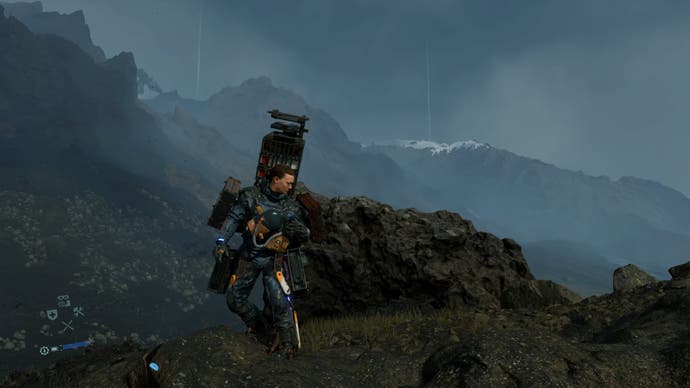
This is path-finding for the augmented reality era, translated but not entirely transformed. You are still reading the land, reading the intent of those who have already passed through, but rather than appraising patches of scuffed earth or silvery conduits of broken grass, you are following breadcrumb trails of emojis and dropped cargo. Paths plotted by other players flourish like ivy on your map screen, some cleaving crudely towards their destinations, others attempting to work with the contours, inching their way from opening to opening. The game even offers an equivalent for the clash between public and private land that shapes countryside paths like the Dales Way. In place of the landlord or sheriff, the game designer - hell-bent on showing you the sights, depositing obstacles to keep you on what is felt to be the most gratifying route. Game design has a term for this kind of optimisation - "the critical path", a path not trampled into being over centuries but laid down at a stroke. Death Stranding is a game about the clash between these two concepts of the path, one that spurs you to outwit the architects of its own geography.
Everywhere, Kojima's world conspires to lead you on, not least in the boutique indie rock songs that trigger, like bandit motion detectors, to heighten the mood as you approach some especially magnificent vista. The game can be blunt in its route-finding, with snarls of eroded rock designed to punish vehicle use and funnel you towards the drizzly shades of the BTs. Its valleys are laced with the impress of unbuilt tarmacked roads, their routes traceable in the mud long before you ferry the requisite raw materials to a 3D printer.
There's even an invisible wall or two. But you are generally free, and encouraged, to shun those bottlenecks and spectral roads, taking inspiration from the meandering trails of other players who are themselves all learning from each other, picking up the threads of each other's motions. And in the process, an unspoken sympathy forms that (thankfully) transcends the plot's lumpy sermonising on the value of human connections. As the proverb goes, the real Death Stranding was the friends we made - or at least, the strangers we Liked - along the way. This is a solidarity reinforced by Death Stranding's mission and reward mechanics, which draw lines between the solitary togetherness of walking a path and the exploitation and despondency of modern couriers.
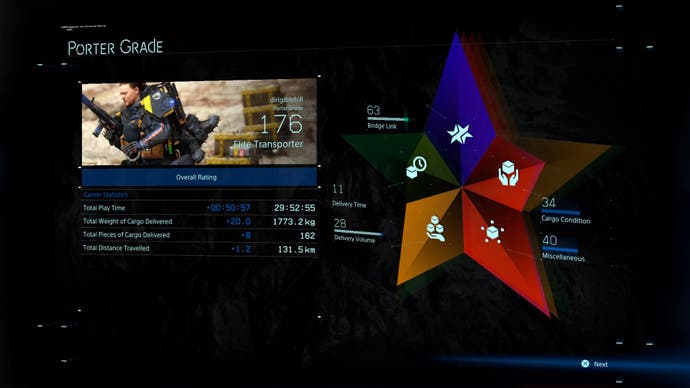
Having finished the game, I'm still unsure whether Death Stranding is yet another blockbuster game like Anthem or Destiny that resembles a zero-hour gig job, or a parody of the same. Either way, it is a comprehensive portrayal of overwork and alienation. As Sam Porter Bridges, you are a curious mixture of chosen one, outside contractor and lab rat. You are told that you are America's last best shot at reunification, but, like the owner of a DPD "franchise", you are also expected to pay for your own gear, from ladders to boots. You are groomed as a national hero but kept handcuffed to a bed while you sleep, so that your very blood can be drained and turned into a weapon. You are invited to revel in your isolation, but every detail of every job is tracked, tallied and served up to you in the form of a nightmarishly over-produced results screen - cargo weight and condition, damage received, route distance, time taken, all of it caught on the points of a misshapen, colour-coded star that somehow corresponds to enhancements to your carrying capacity, speed and stamina.
Some players find this glut of indexables affirming, pointing to the little bonuses you receive for doing something especially pleasing to the client. I find it grating and condescending, a re-gaming of the gamification techniques used by the creators of app software for Amazon warehouse workers. It's designed to put across a nebulous, spiky sense of validation, of 'job well done', with pointless-feeling ranks from Porter up to Master Transporter. You're never really punished for doing a half-arsed job, but the results screen's attention to detail is faintly menacing. In the real world, couriers for companies like Amazon are subject to the same degree of monitoring, with rather steeper consequences - they're fined for minor infractions and have their pay docked if they're unable to deliver packages. The sheer obstructiveness of the reward screen elements - for example, your inability to skip those presidential "Thank You" messages when you recycle your gear - suggests that parody is the goal. But unlike, say, Matthew Seiji Burns's masterful send-up of augmented reality technology in the visual novel Eliza, the obnoxiousness doesn't amount to anything. You're simply left to get used to it.
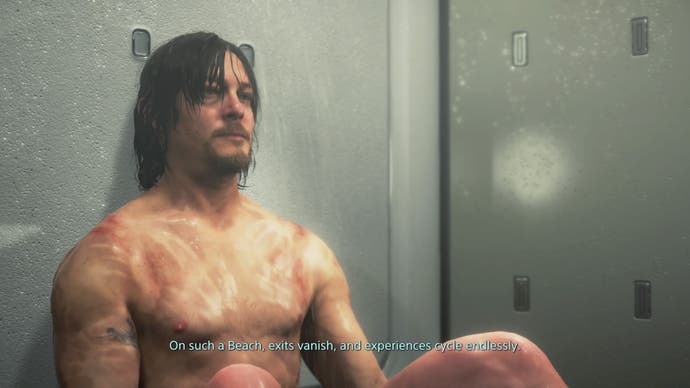
The quiet malignancy of these elements colours even the more generic parts of the game, such as its hub structure and predictably choppy storytelling. Like middle managers armed with GPS trackers, side characters always seem to know where you are, popping up over comms when you approach mission areas to encumber you with tips and backstory. There's no getting away from them. One of Death Stranding's crueller jokes is that Sam's room in each waystation - the weird extra-dimensional alcove he retires to between jobs - is called the Private Room. It's anything but. People are always invading it, shaking Sam from sleep, materialising behind him, even chasing him into the shower. They're often present as holograms, able to walk through Sam and the furniture, which means he can neither have any kind of basic bodily intimacy with them, nor throw them out when he wants to be alone.
For all its comforts, for all the aching relief when he collapses onto the mattress at the end of each job, the Private Room is the place in the game where Sam is most vulnerable, most obviously a mistreated worker. You can see that in how the actor, Norman Reedus, hunches on the edge of his bunk, gazing at the floor. Occasionally he shoots you a wink, points at something or just shakes his head at you in mild vexation. These theatrical quirks are funny at first, and were probably intended to foster a cosy domestic bond with a celebrity character. But the frequency of their repetition, together with the slightly artificial animation, left me unsettled. You start to feel like an intruder yourself, like you're staring into a cage at a chicken weaned on Monster Energy drinks, which has learned to do tricks when scrutinised.
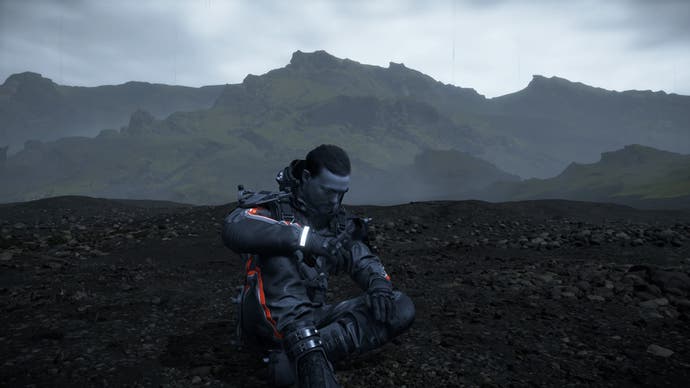
If playing a delivery guy in Death Stranding is often sordid and depressing, this serves a powerful purpose. It pushes you away from what is typically the heart of a blockbuster videogame - the earning of stuff that makes you better at earning stuff - and increases your sympathy for other player path-finders, all likewise fighting for air within a smarmy, draconian system. This contrast contains the seed of a game in which the real society isn't the one achieved via the plot and quests in themselves - certainly not the vast "chiral network" you string together as you shuffle from depot to depot, which proves to have its dark side. Rather, it is about that growing, wordless bond between equally isolated and put-upon labourers.
Death Stranding sabotages this bond, however, via its "Like" system, which comes close to ruining what feelings of companionship it might foster by asking you to think of your paths as ways of scoring points. This turns other players into profit opportunities, rather than fellow travellers, and the act of placing a ladder or bridge just so into one of vaporous economic competition. It's possible to express a lot through the placing of buildings in itself - nothing says "help me" like a single zipline pole on a cliffside, with boxes strewn across the shoreline beneath. A Like, on the other hand, is just an empty morsel of approval that triggers all the bean-counting impulses we've garnered from years of social media saturation. What began as a tacit collaboration becomes a spectral bidding war. Even at this early stage in the game's life, I've found that chokepoints are crowded with emojis designed to exact the maximum Likeage from those passing through.
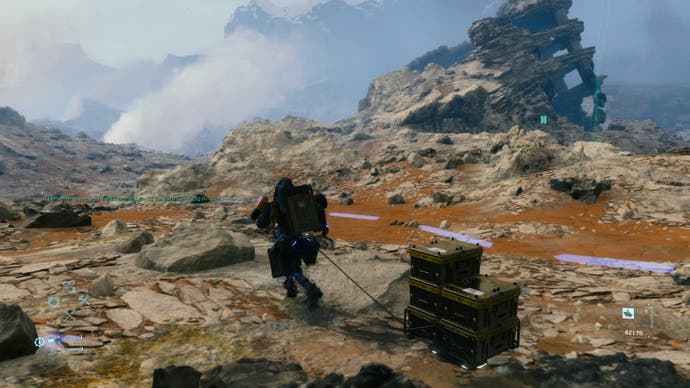
Even without the Likes system, however, Death Stranding's drawback as a fable about the importance of reforging connections is that it never moves beyond that atmosphere of collective toil and deprivation. Rather, what positivity it has to offer relies on the shared experience of being ground-down by the machine. The game casts compassion for other travellers as possible thanks to, rather than in spite of, the alienating effects of doing your job, and in the end, the journey has no meaningful destination: the job is all there is. On completing the story, there is no real material change to Death Stranding's world; you are simply teleported back a few weeks in order to polish off all the consignments you've missed.
If Death Stranding fails itself on this count, however, it is a genuine success in asking what empathy is possible in a world where the delivery of commodities by bedraggled and brutalised workers has become the primary means of human contact. The plotters of the Dales Way envisaged it as a contribution to society, "a true people's path" in the words of one rambler, accessible to walkers of all ages and ability levels at any time of year. Death Stranding lacks this clarity of purpose and commitment to common dignity. It is congested by compromises, regurgitating the managerial structures of a kind of employment that itself owes plentiful debts to the slick manipulations of videogames. In the end, it is yet another work of post-apocalyptic scifi that can't quite imagine the brighter future it gestures toward. But I do think it lays down a path for others to follow.
